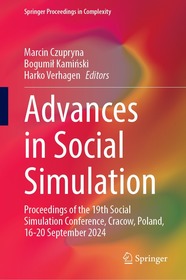
Advances in Social Simulation
Proceedings of the 19th Social Simulation Conference, Cracow, Poland, 16-20 September 2024
Series: Springer Proceedings in Complexity;
- Publisher's listprice EUR 267.49
-
110 941 Ft (105 658 Ft + 5% VAT)
The price is estimated because at the time of ordering we do not know what conversion rates will apply to HUF / product currency when the book arrives. In case HUF is weaker, the price increases slightly, in case HUF is stronger, the price goes lower slightly.
- Discount 12% (cc. 13 313 Ft off)
- Discounted price 97 628 Ft (92 979 Ft + 5% VAT)
Subcribe now and take benefit of a favourable price.
Subscribe
110 941 Ft

Availability
Not yet published.
Why don't you give exact delivery time?
Delivery time is estimated on our previous experiences. We give estimations only, because we order from outside Hungary, and the delivery time mainly depends on how quickly the publisher supplies the book. Faster or slower deliveries both happen, but we do our best to supply as quickly as possible.
Product details:
- Publisher Springer Nature Switzerland
- Date of Publication 30 November 2025
- Number of Volumes 1 pieces, Book
- ISBN 9783031917813
- Binding Hardback
- No. of pages606 pages
- Size 235x155 mm
- Language English
- Illustrations XXIV, 606 p. 153 illus., 119 illus. in color. Illustrations, black & white 700
Categories
Long description:
"
This book covers the latest advances in applying agent-based modelling in social sciences. The Social Simulation Conference is the major global conference devoted to this topic. It is aimed at promoting social simulation and computational social science.
This year’s special theme is “Social Simulation—Crossroads Between Social Science and Computational Methods”, focused on modelling of social phenomena, computational aspects and the theory linking these two scientific fields.
The primary audience of this book are scholars and practitioners in computational social sciences including economics, business, sociology, politics, psychology and urban studies.
" MoreTable of Contents:
"
Agent-Based Social Simulation for Professional Training: What to Know?.- Attitude change through economic narratives.- Blueprinting Organ Donation: A Policy-first Approach for Developing Agent-based Models.- On the liquidity of the illiquid (hard-to-trade) assets.- The effect of models of criminal behavior on police interception strategies.- Combining Vignette Surveys with Agent-Based Modeling: Insights on Fraud Dynamics with Empirically Calibrated Norm Sensitivities.- Strongly Empirical Modelling.- Exploring the complex behaviours of electric vehicle drivers based on an Agent-based Reinforcement Learning method.- Theorizing (co-) evolution of agent-based modelling and simulation for studying community energy systems: the case of collective energy security modelling.- A behavioural agent-based model for housing markets: impact of a financial shock on wealth in the UK.- Bringing worlds together: When public health and social simulation approaches collide.- A Generic Modelling Framework for Last-Mile Delivery Systems.- Towards a Formalism for the Social Identity Approach.- Beyond Numbers: Qualitative Structural Validation of Social Agent-Based Models.- Using an Agent-Based Simulation to Investigate Whether Alternating Normal and Abnormal Conditions Could Benefit Individual and Organizational Fitness.- Modelling Misinformation Spread: The Role of Network Density in Diverse Social Structures.- Toward Automating Agent-based Model Generation: A Benchmark for Model Extraction using Question-Answering Techniques.- Evaluation of Infection Prevention Measures in Elementary Schools using an Agent-Based Model.- Uncertainty Quantification for Agent Based Models: A Tutorial.- Assessing Effectiveness of Anti-Money Laundering System with Agent-Based Model.- Digital Twins for Decision Support in Regional Transforming Steel Industries.- The Agent-based Model of Online Protest and Repression in Authoritarian Settings.- On the effects of decision-making modes on organizational resilience.- Text, interviews, and expert coding: Using qualitative and quantitative data in an agent-based model of compliance with Human Rights judgments.- Modelling for Policy Without Policy Modelling.- How to get people to leave: Exploring the influence of warning message informativity on the evacuation of large-scale events.- Different Facets for Different Experts: A Framework for Streamlining The Integration of Qualitative Insights into ABM Development.- Different Bottom-Up Simulation Methods and Policy Applications: A Perspective.- Relationship Between Family Grant Program and Social Inequality in Brazil: An Agent-Based Model.- Ethical Dimensions to Empirical Applications of Agent-Based Social Simulation.- Episode Map for Stakeholder Engagement in Co-creating Modeling.- Towards Dynamic Population Synthesis Through the Use of Machine Learning.- Multi-Agent Reinforcement Learning for Market Competition in Mobility Services.- Democracy in Crisis: Using Social Simulation to Explore Policies for Countering Radicalization.- Death, Taxes and Inequality: Can a Minimal Model Explain Real Economic Inequality?.- The Role of Network Rewiring in Influencing Extremism and Pluralistic Ignorance.- Invasion of the mind snatchers: the use of generative AI agents in agent-based social simulation.- Invasion of the mind snatchers: the use of generative AI agents in agent-based social simulation.- Real time Parameter Changes in Agent-Based Models with Mesa.- Hill-Climbing or Satisficing: Does the Algorithmic Representation of Human Decision-Making in Agent-based Models of Organizations Matter?.- Towards understanding collective resource use: the role of individual attribution of ecological change.- Health-Economic Synergies of Carbon Emission Reduction Policies.- How Interdisciplinary Are Agent Based Models in General and Those of Human Decision in Particular? A Bibliometric Analysis.
" More



